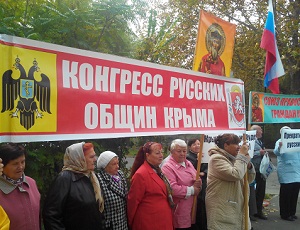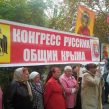
New Crimean Tatar History Book Comes Under Attack from Russian Nationalist Groups
Publication: Eurasia Daily Monitor Volume: 10 Issue: 192
By:

On October 25, members of the Congress of Russian Communities and the Union of the Orthodox Citizens of Crimea picketed in front of the Russian Consulate in Simferopol, the regional capital of Ukraine’s Autonomous Republic of Crimea. The protesters waved Russian and Crimean flags as well as Christian Orthodox icons, and held up banners with slogans such as “We are Russian people on Russian soil,” “Crimean Russians will never give up mother Russia,” “Vozgrin, why do you hate Russian people and Russia?” and “Who preaches hatred, reaps the storm for their children.” Their demonstration was in protest to the recently published four-volume book “History of Crimean Tatars,” by the well-known Russian historian, Professor Valery Vozgrin (https://qha.com.ua/ozabochennie-vozgrinim-russkie-organizatsii-ne-mogut-unyatsya-130991.html), whom they labeled a cynical Russophobe (https://crimea24.info/2013/10/07/avtora-istorii-krymskikh-tatar-nazvali-rusofobom/). The protestors also asked the Russian diplomats in Simferopol to investigate the relationship between Vozgrin, a Russian citizen, and another Russian citizen, who happens to be the book’s sponsor—Lenur Islyamov, an ethic Crimean Tatar businessman from Moscow, who owns several businesses in Crimea (https://qha.com.ua/piketchiki-prizvali-mid-rf-kopat-pod-islyamova-i-vozgrina-131011.html).
During the protest, Sergey Shuvaynikov, the chairperson of the Congress of Russian Communities told journalist that his group is outraged because Vozgrin’s four-volume “History of Crimean Tatars” is, according to him, filled with falsifications of historical truths and baseless accusations that might provoke inter-ethnic conflict in Crimea (https://qha.com.ua/russkie-obschini-krima-nedovolni-trudom-vozgrina-130686.html). Besides his role as a leader of a pro-Russian organization, Shuvaynikov is also a deputy of the Crimean regional parliament (from the Russian Unity Party/Russkoe Edinstvo), as well as a member of the permanent committee of the parliament on land, agriculture, environment, and administrative-territorial structures (https://kianews.com.ua/content/shuvaynikov-sergey-ivanovich).
Shuvaynikov alleged that Vozgrin’s book assaults Russian history and the Russian people. And therefore, the protesters were going to appeal to the Ukrainian and Crimean authorities to declare Vozgrin persona non grata in Crimea as well as initiate a criminal case against him (https://reeana.com/crimea/all-politics/item/6689.html). However, the majority of the pro-Russian picketers admitted to journalists that they had not actually read Vozgrin’s anthology (https://qha.com.ua/pensioneri-s-shuvainikovim-raskritikovali-trud-vozgrina-130803.html).
A week earlier, on October 14, these groups held a similar picket in front of the Mejlis (the de facto Crimean Tatar parliament). During both rallies, the picketers stated that they were especially furious about Vozgrin’s quote in the Crimean Tatar newspaper Avdet, in which Vozgrin stated that what Russians did to Crimean Tatars was similar to what Germans did to the Eastern European Jews (https://crimea24.info/2013/10/11/kniga-rossijjskogo-istorika-vyzvala-protesty-v-krymu/). As the October 14 demonstration came to a close, Shuvaynikov read a resolution: “We, the participants of this picket, reject Vozgrin’s notion of [any] similarity between the Russians and the Nazis during the Second World War, and we are determined to make sure that these types of falsifications do not spread in Crimea” (https://qha.com.ua/pensioneri-s-shuvainikovim-raskritikovali-trud-vozgrina-130803.html). Yet, it is worth noting that in July 2009, the Organization for Security and Cooperation in Europe’s (OSCE) Parliamentary Assembly adopted a resolution in Vilnius that equated Stalinism with Nazism for having committed genocide and crimes against humanity, and called for the international condemnation of both of these totalitarian regimes (www.oscepa.org/members/member…/261-vilnius-declaration-english).
Valery Vozgrin, the author of the book now under attack by Russian nationalist groups in Crimea, is himself an ethnic Russian who was born in Simferopol. He holds a doctorate in historical sciences, is a professor of modern and contemporary history at St. Petersburg State University in Russia, and is the director of the Research Center “Meshnikov Institute.” He is also a member of the Royal Danish Academy of Sciences, and an author of over 150 academic papers published in Russia, Ukraine, Denmark, Norway, Germany, Estonia, Finland, Turkey and Italy (https://history.spbu.ru/index.php?chpu=rus/10/34/42/46/56/343/346).
Vozgrin’s latest anthology on Crimean Tatar history was first presented in Simferopol on August 14, 2013. The opening volume focuses on the earliest history of the Crimean Tatars in Crimea up to the time of the Crimean Khanate. Volume Two details Crimean Tatar history under the rule of the Russian Empire; the third volume elaborates on the Soviet era; and the fourth is about the post-war history of the Crimean Tatars. Vozgrin contends that these four volumes represent 20 years of work. He spent endless hours researching various archives in Ukraine, Russia as well as in Sweden and Denmark. Due to the lack of archival material for the deportation era (Crimean Tatars were deported under the order of Joseph Stalin in 1944), he gathered his information through countless interviews he conducted with elder Crimean Tatars in Uzbekistan and in Crimea; he also gathered old letters, diaries and diplomatic travel notes (https://qha.com.ua/vozgrin-quot-kirim-tatarlarinin-tarihi-carpitiliyordu-quot-99640tr.html).
Although at a first glance, both of the aforementioned rallies could have been interpreted as symptomatic of a conflict over contested histories between the pro-Russian groups and Crimean Tatars, in reality there are several underlying reasons for these conflicts to surface now. As indicated from the slogans on the banners—“We are Russian people on Russian soil,” “Crimean Russians will never give up mother Russia,” “Vozgrin, why do you hate Russian people and Russia?”—Crimean Russians desire for Crimea to be annexed by Russia and this is not a secret. In fact, on October 15, the day after the first protest in front of the Mejlis, in a television interview on ATR channel, Shuvaynikov told journalists he sees Crimea’s future only with Russia and that if a referendum was offered today, in his opinion, the Crimean residents collectively would vote for their peninsula’s annexation to the Russian Federation (https://nr2.ru/crimea/465326.html). It should also be noted that the separatist tendencies of the pro-Russian groups are presently occurring against the background of the European Parliament’s renewed attention to Crimean Tatars (see EDM, October 8), European Commissioner Stefan Fule’s recommendation about the recognition of the Mejlis (EDM, September 27), and the latest OSCE report on the Integration of Formerly Deported People in Crimea (https://www.osce.org/hcnm/104309). These demonstrations, therefore, represent one of the instruments—or last-minute tricks—being utilized by the Kremlin to stir inter-ethnic tensions in Crimea on the eve of the anticipated signing of the Association Agreement between Ukraine and the European Union in November in Vilnius.




